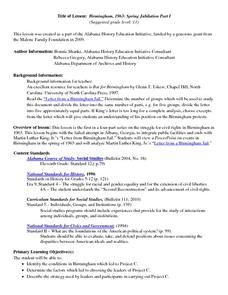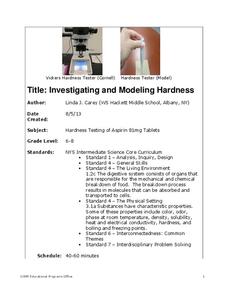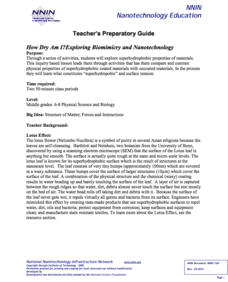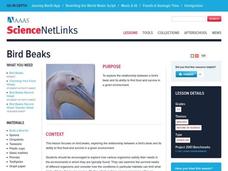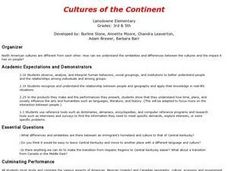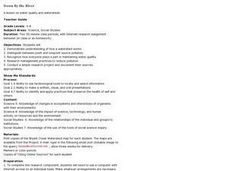NOAA
Animals of the Fire Ice
When the sun's rays can't reach the producers in a food web, where does all the energy come from? Extreme environments call for extreme food sources. Young scientists investigate creatures that appear to get their energy from methane...
University of Minnesota
Connect the Neurons!
Create a neuron frenzy as your pupils play the part of the neurons. An engaging lesson creates a human chain of neurons that pass cotton balls posing as neurotransmitters. Scholars learn about pre- and post-synapses as they complete the...
CCSS Math Activities
Smarter Balanced Sample Items: High School Math – Claim 4
What is the appropriate model? Sample problems show the extent of the Smarter Balanced assessments Claim 4, Modeling and Data Analysis. Items provide pupils the opportunity to use mathematical modeling to arrive at a reasonable answer....
Teach Engineering
Biomes and Population Dynamics - Balance Within Natural Systems
How large can a population become? The fifth installment of a nine-part unit teaches young ecologists about limiting factors that determine the carrying capacity of species in the Sonoran Desert. Here is a PowerPoint to help present this...
University of North Carolina
Communication Studies
A degree in communications incorporates disciplines such as business, law, and media as well. A writing handout offers prospective communications majors information about what kind of assignments to expect in a typical course....
Ohio Literacy Resource Center
Compare & Contrast Essay
Comparing two texts can build a greater understanding of the texts and themes of the works. Take some time to follow the steps here to guide your pupils through the process of composing compare-and-contrast essays.
Curated OER
Unit 3: Scientific Writing
Write-on! Demonstrate a writing model and support learners as they write an informational essay on a water resource issue of your (or their) choosing. The lesson plan provides a well-scaffolded summative writing experience that wraps up...
Alabama Department of Archives and History
Birmingham 1963: Spring Jubilation Part 1
As part of a study of the 1963 quest for civil rights in Birmingham, Alabama, class members view a PowerPoint that details the struggle and analyze Martin Luther King, Jr.'s "Letter from a Birmingham Jail."
Carnegie Library
Creative Writing: Middle School Lesson Plan
Enhance a unit on historical fiction with an engaging writing lesson. Learners bring the Industrial Era to life as they compose their own historical fiction pieces based on primary source images of Pittsburgh steel workers.
Oklahoma State University
Hairy Heredity
Young scholars learn that heredity comes down to the flip of a coin with this cross-curricular math and science lesson. Using smiley faces as a model, students toss coins to determine which dominant or recessive traits will be passed on...
Federal Reserve Bank
Measuring the Great Depression
Young historians examine the cost of goods and services through the Consumer Price Index (CPI), output measured by Gross Domestic Product (GDP), and unemployment measured by the unemployment rate to gain an understanding of the economic...
Curated OER
Building Empathy Creating Community
Learners thrive in a classroom where they are part of a strong community. Foster a collaborative atmosphere in your classroom with a series of activities focused on conflict resolution, communication, empathy, and defense against bullying.
EngageNY
Systems of Equations
What do you get when you cross a circle and a line? One, two, or maybe no solutions! Teach learners to find solutions of quadratic and linear systems. Connect the visual representation of the graph to the abstract algebraic methods.
Cornell University
Investigating and Modeling Hardness
Model hardness testing with a self-designed hardness test. Young scholars rate the hardness of different types of aspirin using the Vicker's Hardness scale. They then relate hardness to the solubility of each aspirin tablet.
National Nanotechnology Infrastructure Network
How Dry am I? Exploring Biomimicry and Nanotechnology
Help your classes feel like they can walk on water! An engaging inquiry-based lesson has young scholars experiment with different surface coatings. They make observations about their properties and how they relate to the surface tension...
Kenan Fellows
Making Connections with Water Quality
What's in your water? And, why is water quality so important? Enhance your class's level of water appreciation through a lesson that demonstrates the necessity of water quality. Environmental enthusiasts explore the EPA's Clean Water...
Serendip
Using Models to Understand Cellular Respiration
Energize biologists with colorful images in an activity that captivates the imagination while demystifying the subject of cellular respiration. Participants build comprehension skills and access core content knowledge by analyzing text...
Curated OER
Choose Your Defense: Spines, Vomit and Camouflage
Students investigate defensive mechanisms of insects and organisms. In this biology lesson, students draw imaginary caterpillars as well as imaginary parasites that will harm the caterpillar. Students utilize the Internet to discover...
Curated OER
Bird Beaks
Students explore the relationship between a bird's beak and its ability to find food and survive in a given environment.
Curated OER
Cultures of the Continent
Students explore the various cultures of North America. They examine the differences and similarities between an immigrant's homeland and the culture of Central Kentucky. Students discuss strategies to make the transition easier for...
Curated OER
United States & Canada: How Are We The Same? How Are We Different?
Pupils compare and contrast similarities and differences between Canada and the US. In this geography lesson, students read various articles and identify similarities and differences in economies, cultures, geography, climate, and...
Curated OER
Down By the River
Students examine how watersheds work and determine the difference between point and nonpoint source pollution. They research management practices to reduce pollution and investigate how everyone can participate in reducing water pollution.
Curated OER
Traveling Nitrogen
Students demonstrate and understanding of the nitrogen cycle by taking roles and interacting with others in a simulation activity.
Curated OER
Organization of Fairfax County Government
Middle schoolers identify Fairfax County government as council-manager government, describe term of office held by members of Board of Supervisors and districts they represent, how Chairman of Board of Supervisors is elected and term and...









